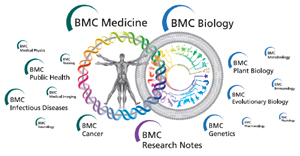
With apologies to Shakespeare, when to reject is a question that both authors and editors must care about deeply. For many journals, especially those with space constraints or limited scopes, rejection can be more common than peer review. The BMC series, however, has no space constraints, have broad scopes in many cases, and for the subject-specific journals (not including the flagships BMC Biology or BMC Medicine) an ethos to “publish work deemed by peer reviewers to be a coherent and sound addition to scientific knowledge and to put less emphasis on interest levels, provided that the research constitutes a useful contribution to the field.”
So, for the BMC series, when is it right to reject?
Scope
It is rare for the BMC series to reject on the grounds of scope. With 63 journals spanning biology and medicine, it is usually possible to find a home somewhere in the series and if not we will do our best to recommend a suitable alternative journal, and transfer it direct if possible. If we can help an author find a good location, we will.
Soundness
The most obvious criterion for rejection, and one by which most journals abide, is scientific unsoundness. At times a manuscript might be seriously flawed or beyond repair. We still try to provide useful feedback for authors – either as Editors, when rejecting without peer review, or via the reviewer reports when unsoundness becomes clear only after detailed assessment by the reviewers. However, irrevocable unsoundness is not all that common, and in many cases some revision would render a submission sound. For the BMC series, we would prefer to invite an author to revise their work, to both expedite the process, and also reduce the burden on reviewers. However, a manuscript CAN be rejected if the revisions needed are so extensive that a very substantial time would be needed to achieve them – generally longer than 3 months. It is sometimes the case that a non-native English speaker struggles with writing to the extent that the soundness of an article is not clear. In those circumstances, we will advise authors to contact a copy-editing company (for example, Edanz, with whom BioMed Central authors receive a discount) to improve their manuscript before proceeding with peer review, or to use our Author Academy to assist with their writing.
Interest
For the BMC series we have always asked reviewers to separate their judgment of ‘soundness’ from their judgement of perceived level of ‘interest’. By doing so we ensure that peer review fulfils its dual role – both improving and confirming the basic soundness ofpublishable research and also helping to identify the most interesting research which we can then highlight further via Editors’ picks, press releases or commissioned commentaries.
Broadly, if a manuscript advances scientific knowledge, it should be suitable for the BMC series. We apply some standard criteria to specific article types (for example, study protocols) and to specific journals according to gold standards for the relevant fields. Interest is assessed by the Executive Editor, the Section and Associate Editors, and the peer reviewers. From an author perspective, it is always best to be clear in both the manuscript and cover letter what you consider the contribution to be, and if possible generalise your results whilst not overstating your claims.
A manuscript which provides a very limited contribution may be offered further consideration in BMC Research Notes – this journal provides a home for short publications, case series, and incremental updates to previous work with the intention of reducing the loss suffered by the research community when such results remain unpublished. If a manuscript is transferred, any previous reviews can be considered, both to assist the process for the authors, and also reduce the review burden on editors and reviewers. This portability of peer review improves the speed and efficiency with which research is communicated.
Other reasons to reject
The last – and hopefully rarest! – reason to reject might be because of concerns about research ethics or publication ethics. In all cases where researcher or author misconduct is suspected, the BMC series will adhere to the guidelines of the Committee on Publication Ethics (COPE).
Overall, the BMC series does not aim to reject manuscripts. Instead, we want to help authors get published – as long the work is sound and providing a contribution to the field. We will help authors find the right journal for submitted work, and we want to provide feedback to help authors improve. So rejection should not be taken lightly!
Dr Jo Appleford-Cook
Publisher, BMC series
Comments